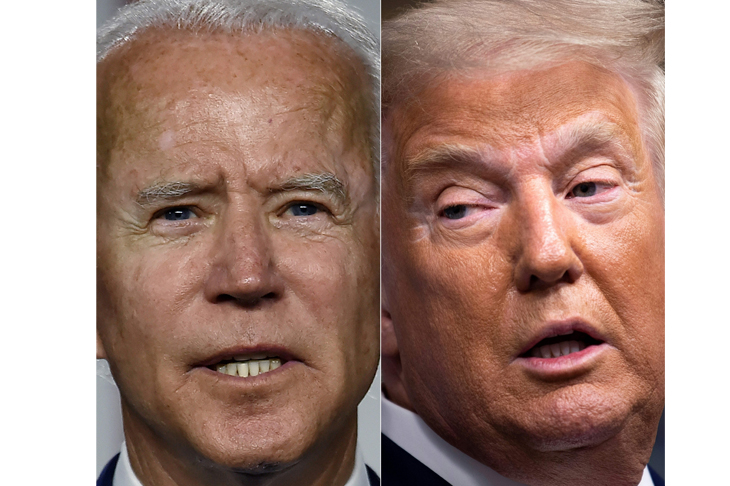Donald Trump will surely accept defeat and concede victory to Joe Biden with the same grace and generosity of spirit that Hillary Clinton and the Democratic party have shown him since his election in 2016.
The international gold standard for ‘free and fair’ election is the secret ballot in a secure setting free of coercion. Trump’s prospects for a successful reversal of the 2020 outcome are slim. Yet he should litigate the result to highlight the potential for electoral fraud and identify ways to promote transparency and protect ballot integrity.
America is no stranger to allegations of stolen elections, from John F. Kennedy’s 1960 to George W. Bush’s 2000 victories, through voter suppression and ballot stuffing. In my home state of Bihar ‘booth capturing’ used to be common. Armed hoodlums took over a booth and made election officials an offer they couldn’t refuse: take the bribe and look away or be killed. In the US they’ve gone one better with the miracle of dead citizens still doing their civic duty to vote. New Jersey Governor Brendan Byrne reputedly quipped he’d like ‘to be buried in Hudson County so I can remain active in Democratic politics’.
Around 160 million people voted this year, almost half by post. The latter is more vulnerable to mistakes, manipulation and tampering than in-person voting in designated polling stations with scrutineers from all parties to observe voting and counting. What we have this year is the ‘perfect storm’ of mass mail-in voting with inherently less rigorous checks, an uneven and imperfect election machinery that differs from one state to another, a winner-take-all system where victory in the vote count no matter how slim the margin yields all its electoral college votes and narrow margins of victory in enough states to give one candidate the decisive edge in the electoral college. Into this combustible mix throw the spark of a pugnacious president who doesn’t do nice and harbours a burning resentment at the treatment meted to him by the Democrats, the Washington establishment and the mainstream media.
There’s been little evidence to prove fraud. The most likely outcome will be some votes will be discarded, others added, with numbers too small to change the overall result and Biden will take office on 20 January. But if Trump sows sufficient doubt, he could delegitimise the Biden presidency as payback for the relentless assault on the legitimacy of his own election and position himself to be the standard-bearer again in 2024. His base is big and loyal enough that if the Republican establishment were to intervene to deny him the party nomination, he could run as an independent and wreck the party. One reason for their intense loyalty is Trump doesn’t cave but punches back, as with the scurrilous assault on Justice Brett Kavanaugh. He’s the right champion at the right time to channel frustrated anger into constructive reforms.
Over 70 million people voted for Trump. Had Covid not intervened, had he not misbehaved so badly in the first debate, had the Pfizer vaccine announcement come the week before and not after 3 November are among the many might-have-beens. Given the relentless negativity and hostility by the Democrats, political-intellectual establishment and the media that tried to paint Trump as Hitler’s second coming, this is an astonishing outcome. It shows just how disconnected the social, political, economic and cultural elite is from heartland America and how much hostility exists across the land towards the identity-obsessed woke agenda. This mass of seething, alienated, resentful Trump loyalists will nurture long-lasting grievance about a stolen election. Conspiracies breed in darkness and the best disinfectant is sunshine.
Having the claims of electoral fraud tested through the rigorous judicial process and shown to be false will be critical to appeasing the anger in Trumpland. Take your most hateful despotic ruler of choice – Vladimir Putin in Russia, Augusto Pinochet in Chile, Hosni Mubarak in Egypt or Saddam Hussein in Iraq. Imagine he’s agreed to elections and by the close of the day, with two-thirds of the votes counted, he is behind 45:55. Counting stops, resumes the next day, and with 80-90 per cent of the new votes in his favour, he pulls off a miraculous victory. A colour revolution would erupt and we’d all support it.
Of course what’s just happened in the US is different and postal ballots were expected by all sides to overwhelmingly favour Biden. There are multiple pathways through which, and multiple points at which, the machinery can be corrupted. But proving electoral malfeasance to an appropriately rigorous standard in a court of law is an extremely tough ask. Statistically improbable results and anomalies in critical precincts will rarely cut the mustard as a legally acceptable standard of proof of malfeasance.
This may mark the end of the dominance of the in-person voting on one fixed date across the country. This is welcome. It could expand voter turnout as people can more easily vote at a time and in the manner of their choosing. But if postal votes are going to be cast in big enough numbers to determine individual and overall party seats, then all countries need to pay much more careful attention to safeguards to ensure the integrity of process and legitimacy of outcome.
Think of it as analogous to the chain-of-custody argument with respect to evidence in criminal trials. It’s inadmissible unless security can be established at every link in the chain. With postal ballots, this begins with how the ballots are mailed out, to whom and at what address, steps taken to protect against ballot harvesting, verification of voter identity, how the votes are received, stored and counted and what other steps are taken to prevent tampering, interference, padding with phantom votes and illegal invalidation. There’s one other consideration. The underlying philosophy relies on the sanctity of the individual voter in the polling booth free of any peer, family or political pressure from anyone to cast a vote in complete secrecy. Accepting that this cannot be perfectly replicated, how can it be best approximated with mail-in votes?
The more that rules and procedures are standardised across states, the more credible and easier to implement will be the process. Court challenges by Trump will help to identify, firstly, the entire chain of custody and secondly, the weak and vulnerable points in the whole chain. It might also help to generate some momentum to create an independent, unified electoral machinery and standardised voter IDs.
Got something to add? Join the discussion and comment below.
Get 10 issues for just $10
Subscribe to The Spectator Australia today for the next 10 magazine issues, plus full online access, for just $10.
You might disagree with half of it, but you’ll enjoy reading all of it. Try your first month for free, then just $2 a week for the remainder of your first year.














Comments
Don't miss out
Join the conversation with other Spectator Australia readers. Subscribe to leave a comment.
SUBSCRIBEAlready a subscriber? Log in